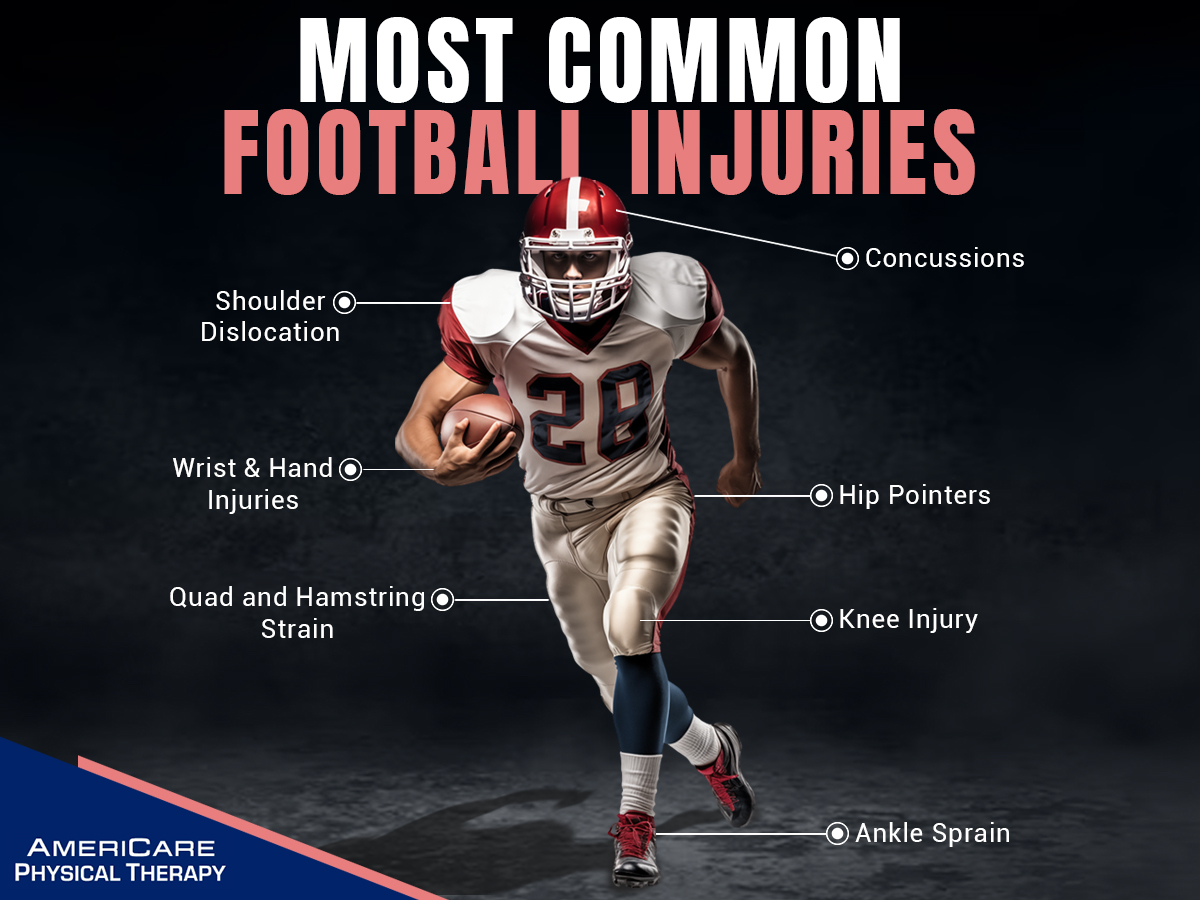
Football is a physically demanding sport, and given the size and speed of these athletes, it should be no surprise that football has a very high injury rate. However, these players ensure they are fit and train well to stay in shape. Unfortunately, unforeseen accidents can happen on the field, leading to injuries that take time to heal and disrupt their careers and lives. Luckily there is a solution! Physical therapy can treat injuries and give football players proactive therapy and exercises to recover from setbacks and allowing them to return to the field stronger and more resilient than ever before.
Ankle sprains are among the most prevalent injuries in football, frequently occurring due to sudden changes in direction, collisions, or missteps on uneven terrain. The rapid twisting motion can cause the ligaments supporting the ankle to stretch beyond their normal range, leading to pain, swelling, and instability. Physical therapy plays a crucial role in the rehabilitation of ankle sprains, focusing on restoring range of motion, strength, and proprioception. Through a combination of exercises, manual therapy, and functional training, physical therapists help athletes regain stability and confidence in their injured ankles, reducing the risk of re-injury and facilitating a safe return to play.
Anterior cruciate ligament (ACL) tears are dreaded injuries that can sideline football players for an extended period. Whether it's a sudden stop, change in direction, or direct impact, the forces exerted on the knee joint during gameplay can place immense stress on the ACL, resulting in partial or complete tears. ACL tears not only cause significant pain and swelling but also compromise the stability of the knee, hindering an athlete's ability to perform at their best. Rehabilitation after ACL reconstruction surgery is multifaceted, involving progressive strengthening exercises, neuromuscular training, and sport-specific drills. Physical therapists work closely with athletes to address deficits in strength, balance, and proprioception, guiding them through each stage of recovery with the goal of returning to pre-injury levels of function and performance.
Hamstring strains are a common affliction for football players, particularly those who rely on explosive speed and agility. The powerful contractions of the hamstring muscles during sprinting, kicking, and jumping can subject them to excessive stress, leading to strains or tears. Hamstring injuries often manifest as sharp pain in the back of the thigh, accompanied by swelling and tenderness. Physical therapy for hamstring strains focuses on reducing pain, restoring flexibility, and improving strength and neuromuscular control. Through a combination of stretching, eccentric strengthening, and functional exercises, physical therapists help athletes rebuild damaged muscle tissue, mitigate risk factors for re-injury, and optimize performance on the field.
Concussions represent a significant concern in football, given the high-speed collisions and physical contact inherent to the game. A concussion occurs when the brain undergoes rapid acceleration and deceleration within the skull, leading to a disruption of normal neurological function. Symptoms of a concussion can range from mild headaches and dizziness to more severe cognitive impairment and loss of consciousness. Physical therapy for concussions focuses on symptom management, cognitive rehabilitation, and gradual return-to-play protocols. Through a combination of vestibular rehabilitation, vision therapy, and exertional testing, physical therapists help athletes navigate the complexities of concussion recovery, prioritizing safety and long-term brain health.
Shoulder injuries are commonplace in football, particularly among players involved in blocking, tackling, and throwing. Dislocations, separations, rotator cuff tears, and labral tears are among the most common shoulder injuries seen in football. The repetitive overhead motions and high-impact collisions associated with the sport can place tremendous stress on the shoulder joint, leading to structural damage and functional impairment. Physical therapy interventions for shoulder injuries include pain management strategies, joint mobilizations, and progressive strengthening exercises. By targeting specific muscle groups, improving scapular stability, and optimizing shoulder mechanics, physical therapists help athletes regain range of motion, strength, and confidence in their shoulders, enabling them to return to the field with reduced risk of re-injury.
Knee meniscus tears are a frequent occurrence in football, often resulting from twisting or pivoting motions on a planted foot. The menisci are crescent-shaped cartilage structures that provide cushioning and stability within the knee joint. Tears to the meniscus can cause pain, swelling, and mechanical symptoms such as catching or locking of the knee. Physical therapy for meniscus tears focuses on reducing pain and inflammation, restoring joint mobility, and improving strength and proprioception. Through a combination of manual therapy, therapeutic exercise, and activity modification, physical therapists help athletes navigate the challenges of meniscus injuries, guiding them toward optimal recovery and a safe return to play.
Muscle strains, such as quadriceps strains, calf strains, and hip flexor strains, are prevalent in football and can occur during explosive movements or sudden changes in direction. These injuries often result from overstretching or overloading of the muscle tissue, leading to pain, swelling, and limited range of motion. Physical therapy interventions for muscle strains include rest, ice, compression, and elevation (RICE), followed by progressive rehabilitation exercises aimed at restoring strength, flexibility, and function. By addressing underlying biomechanical issues and implementing appropriate training modifications, physical therapists help athletes overcome muscle strains and prevent future injuries.
In addition to these specific injuries, physical therapy can also help football players with overall conditioning, injury prevention programs, and biomechanical assessments to identify and address potential risk factors for injury.
Contact AmeriCare PT to assess your injury and prepare a long-term plan to strengthen your body for excellent performance on the football field. Here we provide professional assessment of your body’s needs and care before, during and after an injury to restore your body for optimum performance.